Related Research Articles

The DDR-Oberliga was the top-level association football league in East Germany.

DSC Arminia Bielefeld, or just Arminia, is a German sports club from Bielefeld, North Rhine-Westphalia. Arminia is most well known as a professional football club, having participated in the first tier of German Football, the Bundesliga, for a total of 19 seasons. In addition to football, the club offers field hockey, figure skating, and cue sports departments. The club has over 15,000 members and the club colours are black, white and blue. Arminia's name derives from the Cheruscan chieftain Arminius, who defeated a Roman army in the Battle of the Teutoburg Forest.

1. FC Magdeburg is a German Association football club based in Magdeburg. The club was founded in 1965 from the football department of the sports club SC Magdeburg and has been one of the top teams in the DDR-Oberliga, winning three championships and seven cup titles. By winning the European Cup Winners' Cup in 1974, the club became the only East German club to win a European trophy and also achieved the greatest success in its history. After German reunification, the club fell on hard times but returned to professional football in 2015 with the promotion to the 3. Liga. Afterwards the team managed in 2018 to climb up to the second division, in which the team plays today.

The 2. Bundesliga is the second division of professional football in Germany. It was implemented 11 years after the founding of the Fußball-Bundesliga as the new second division for professional football. The 2. Bundesliga is ranked below the Bundesliga and above the 3. Liga in the German football league system. All of the 2. Bundesliga clubs take part in the DFB-Pokal, the annual German Cup competition. A total of 127 clubs have competed in the 2. Bundesliga since its foundation.
Rocco Milde is a German former professional footballer who played as a forward. Milde had a much-travelled career, but is best remembered as a Dynamo Dresden player, having had three separate spells with the club.

Frank Lieberam is a German former football player and manager.

Dirk Heyne is a former German football goalkeeper turned manager.
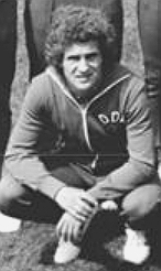
Wolfgang "Maxe" Steinbach is a German former football player and manager who spent most of his career playing for 1. FC Magdeburg in the DDR-Oberliga. At international level, he made 28 appearances for the East Germany national team scoring one goal. In 2006, he was elected Best 1. FC Magdeburg Player of All Times in a telephone vote.

Matthias Maucksch is a German former footballer who played as midfielder or defender and worked as a manager in different Teams of Germanys 4th and 3rd leagues.
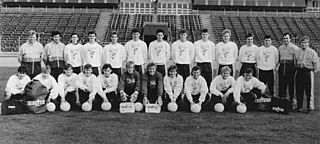
Jörn Lenz is a German former professional footballer who played as a defender. Lenz had four different spells with BFC Dynamo during his professional playing career and has continued to serve as part of the club's backroom staff since retiring in 2008. Lenz played a total of 374 matches for BFC Dynamo between 1988 and 2008. He made two appearances for BFC Dynamo in the 1989-90 European Cup Winners' Cup.

Damian Halata is a German former professional football player and manager. Born in Poland, he represented the East Germany national team internationally.
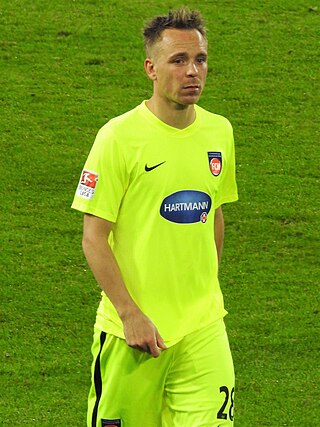
Arne Feick is a German former professional footballer who played as a midfielder.
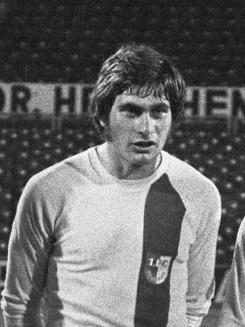
Siegmund Mewes is a former East German football player and manager.

Ulrich "Ulli" Schulze is a German football manager and former player. A goalkeeper, he made one appearance for the East Germany national team.
Axel Wittke is a German former footballer who played as a right midfielder in the DDR-Oberliga and the 2. Bundesliga. In 1983, he won the FDGB-Pokal, the East German cup with 1. FC Magdeburg. He played for his country at youth level and was part of the Olympic Games squad that failed to qualify for the 1988 Summer Olympics.

Frank Siersleben is a German former football player and manager. He spent the majority of his career with 1. FC Magdeburg playing in the DDR-Oberliga, East Germany's top flight, and won 23 caps for East Germany youth national teams.

Thomas Gerstner is a German football manager and former player. He is the manager of the German club SV Straelen.
The 2010–11 season is the 101st season of competitive football in Germany.

Detlef Irrgang is a German former professional footballer who played as an attacking midfielder. He is best remembered for his two spells with Energie Cottbus, spanning 22 years, over 400 appearances, and the reunification of Germany.
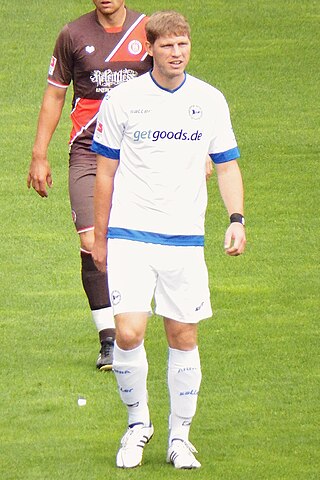
Fabian Klos is a German former professional footballer who played as a forward.
References
- 1 2 Arnhold, Matthias (21 January 2016). "Markus Wuckel - Matches and Goals in Oberliga". Rec.Sport.Soccer Statistics Foundation. Retrieved 28 January 2016.
- ↑ Burkamp, Peter (24 April 2021). "Arminias neuer Trainer kommt aus dem Altkreis". Haller Kreisblatt.